专四语法专项训练 反义疑问句
- 格式:doc
- 大小:16.50 KB
- 文档页数:2
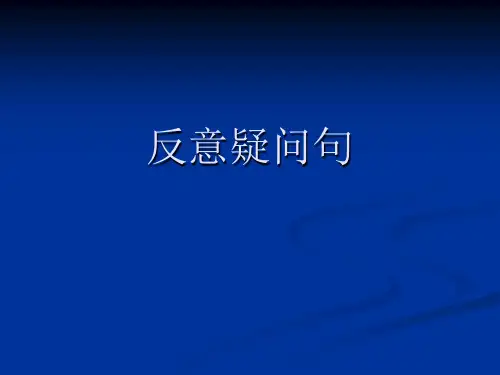
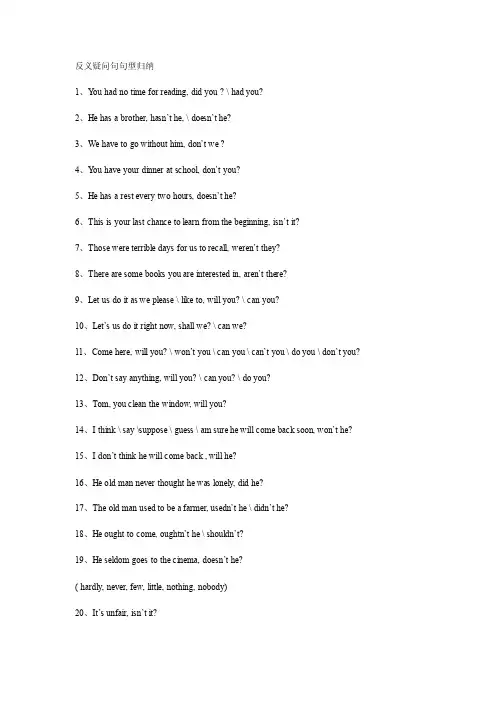
反义疑问句句型归纳1、Y ou had no time for reading, did you ? \ had you?2、He has a brother, hasn’t he, \ doesn’t he?3、We have to go without him, don’t we ?4、Y ou have your dinner at school, don’t you?5、He has a rest every two hours, doesn’t he?6、This is yo ur last chance to learn from the beginning, isn’t it?7、Those were terrible days for us to recall, weren’t they?8、There are some books you are interested in, aren’t there?9、Let us do it as we please \ like to, will you? \ can you?10、Let’s us do it r ight now, shall we? \ can we?11、Come here, will you? \ won’t you \ can you \ can’t you \ do you \ don’t you?12、Don’t say anything, will you? \ can you? \ do you?13、Tom, you clean the window, will you?14、I think \ say \suppose \ guess \ am sure he w ill come back soon, won’t he?15、I don’t think he will come back , will he?16、He old man never thought he was lonely, did he?17、The old man used to be a farmer, usedn’t he \ didn’t he?18、He ought to come, oughtn’t he \ shouldn’t?19、He seldom goes to the cinema, doesn’t he?( hardly, never, few, little, nothing, nobody)20、It’s unfair, isn’t it?21、One can’t be careful enough, can one \ can he?22、Everything goes well, doesn’t it?23、Everybody agrees with him, doesn’t he \ don’t they?24、All w e needed has been bought, hasn’t it?25、All we invited have arrived, haven’t they?(All refers to people)26、Learning English is very hard, isn’t it?27、He studies hard and he is often praised by his teachers, isn’t he?28、We must be more polite in this occasion, needn’t we?29、He must be a brave man, isn’t he?30、It must have rained last night, didn’t it?31、He mush have known the answer, hasn’t he?32、He can’t have done such a foolish thing, has he?33、I am a student, aren’t I ?34、So he has known the secret, has he?35、Oh, you have the same type of sell phone as I, do you?反义疑问句注意一、反义疑问句是疑问句的一种,它对陈述部分的事实提出相反的疑问,形式上是一个省略问句,附加在陈述句后,即:陈述句+ 逗号+ 省略问句+ 问号Y ou are from America, aren’t you?注意二、遵循前否定后肯定或前肯定后否定的原则(但在祈使句等一些特殊句子中需注意,详细见注意七)Jim isn’t in Class Four, is he?注意三、附加疑问句必须前后两句主语相同Mr Zhang has been here for four years, hasn’t he?注意四、附加疑问句部分与主语不一致的若干情况如下(需牢记)1.this 或that改it,无论是否指人This is your brother, isn’t it?2. these或those改theyThose are books ,aren’t they?3. 不定代词one改one或heOne can’t be always young, can one / he?4. something、anything、everything和nothing改itNothing is serious, is it? (注意为什么后面用is it而不是isn’t it?)Everything seems all right, doesn’t it?5. everybody、everyone、somebody、someone、anybody、anyone、nobody改they或he(任选,但选定后注意单复数形式)Everyone knows this, don’t they / doesn’t he?Nobody likes to lose money, does he? (这里最好用he)6.each of改he或theyEach of the boys had an apple, didn’t he / they?7. no one, none, neither, either改they 或heNo one came, did they?8. some of…、none of …改it、they或you(联系上下文或句子)None of the food was delicious, was it?Some of the dustmen have come back, haven’t they?9. 由neither…nor…、not only…but also、both…and…、either…or…、not…but…、…or…、…and…等连接的并列主语,改复数代词Neither you nor I am wrong, are we?Both Tom and Jack came, didn’t they?10. 由动词不定式、动名词、从句或词组构成的主语,改itTo learn English well isn’t easy, is it?Swimming is great fun, isn’t it?11. the + 形容词表示一类人,改复数代词The poor had no right (权力) to speak at the time, did they?12. there 引起的句子(There be句型等),仍用thereThere stands a house and a lot of trees, doesn’t there?There are many children in the park, aren’t there?注意五、附加疑问句部分与谓语不一致的若干情况如下(需牢记)(初中阶段14点18点和19点可以常识性了解)1. have (有)改have或doMary has two brothers, doesn’t she / hasn’t she?2. have (有)必须与陈述部分一致He hasn’t a lot of time, has he?Miss Green doesn’t have any money in her pocket, does she?3. have不做“有”解释,必须用doThey all have a good time, don’t they?4. have to用do或haveWe have to g et up early, don’t we / haven’t we?5. have got to用haveWe have got to answer all the questions, haven’t we?6. had better用should或hadWe had better go right now, shouldn’t we / hadn’t we?7. can’t(不可能,表示推测)根据can’t或的动词选择相应的形式He can’t be a doctor, is he?The workers can’t have finished their work, have they?8. may 用may + 主语+ not (英语中不用mayn’t)They may be here next week, may they not?9. must(必须)用needn’tY ou must do it today, needn’t you?10. must(应该)用mustn’tI must study hard, mustn’t I?11. mustn’t用must或mayY ou mustn’t talk like that, must you?We mustn’t stay here any longer, must we?12. “must be”对现在情况进行推测作一般现在时或现在进行时的附加疑问句进行处理2 反义疑问句He must be happy, isn’t he?He must be working hard at the office, isn’t he?must表示推测时,也有用mustn’t的He must have been working very hard, mustn’t he?Y ou must have told Mr Wang the secret, mustn’t you?13. “must + 完成时”表示对过去情况的推测,作一般过去时附加疑问句处理He must have come yesterday, didn’t he?Y ou must have seen the play last week, didn’t you?14. “must + 完成时”用来推测过去的动作持续到现在按现在完成时的附加疑问句来处理Y ou must have studied English for years, haven’t you?He must have lived here for at least ten years, hasn’t he?14. 实义动词need和dear用doHe needs help, doesn’t he?I have never dared to ask him, have I?15. 情态动词need和dear用need和dearHe dare not say so, dare he?We need not do it again, need we?16. needn’t 用need或mustY ou needn’t go yet, need you?He needn’t do that, must he?17. “ would rather + 动词原形”和“would like to + 动词原形”用wouldn’tHe would rather read the t ext ten times than recite it, wouldn’t he?Y ou’d like to have some bananas, wouldn’t you?18. “ought to + 动词原形”用oughtn’t 或shouldn’tThe child ought to be punished, oughtn’t he?We ought to go there, shouldn’t we?19. “used to + 动词原形” 用“didn’t + 主语”或“usedn’t + 主语”或“used + 主语+ not”He used to live in London, usedn’t he / didn’t he?He used to play football when he was a child , used he not?注意六、句子中有seldom, hardly, no, not, never, few, little, nothing, nobody, nowhere等是否定句,附加疑问部分必须采用肯定形式Nobody phoned while I was out, did they?He is hardly able to swim, is he?There is little ink in your pen, is there?no one, nobody, none, nothing, neither等作动词的宾语时,附加疑问部分一般采用肯定形式(也偶尔用否定形式)He has nothing to say, does(n’t) he?Y ou got nothing fr om him, did(n’t) you?注意七、一些特殊句型的附加疑问句1. I am…改aren’t II am your friend, aren’t I?2. I wish to do sth或I wish I …改may II wish to go home, may I?I wish I were you, may I?3. 主从复合句,与主句的主谓语保持一致He says that I did it, doesn’t he?Da vid wouldn’t go there if it rained, would he?4. 并列句,与邻近的分句保持一致Mary is a nice girl, but she had one short-coming, hadn’t she?5. 表示邀请,请求的祈使句,附加疑问部分用will you或won’t you或would you等,一般只要记住will you就可以了,不遵循前否定后肯定或前肯定后否定的原则Come here, will you?Turn off the light, will you?Do sit down, will you?6. 表示告诉别人做某事的祈使句,用will you、can you、would you或can’t you、won’t you Stop talking, can you?Write down the new words, will you / won’t you?7. 否定的祈使句用will you或can youDon’t make a noise, will / can you?8. Let me …用will you 或may ILet me help you, may I?Let me do it, will you?9. Let’s …表示建议包括听话人在内,用shall weLet’s go for a walk, shall we?10. let us …表示允许,不包括听话人在内,用will youLet us do it by ourselves, will you?11. Let接第三人称宾语时用will youLet him come in, will you?12. Let’s not … 用OK或all rightLet’s not go to the party, OK / all right?13. 感叹句用一般现在时be的形式(故事中用一般过去时be的形式)What fine weather, isn’t it?How clever the boy is, isn’t he?How hard she works, isn’t she?。
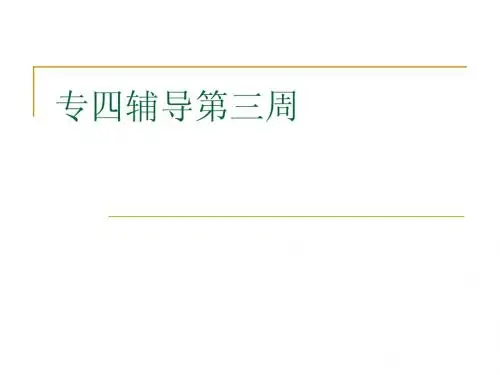
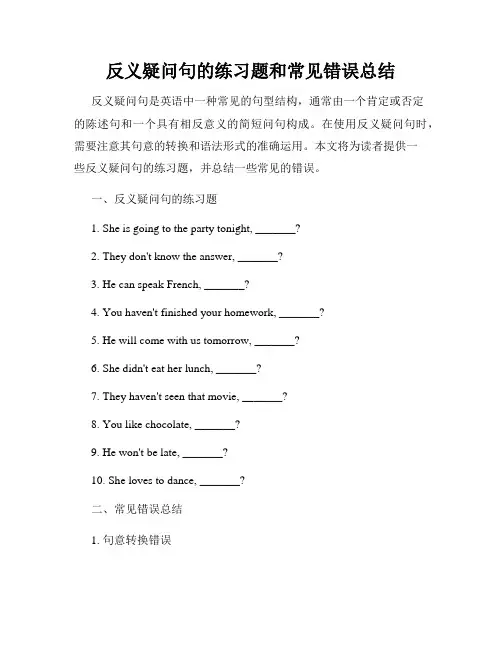
反义疑问句的练习题和常见错误总结反义疑问句是英语中一种常见的句型结构,通常由一个肯定或否定的陈述句和一个具有相反意义的简短问句构成。
在使用反义疑问句时,需要注意其句意的转换和语法形式的准确运用。
本文将为读者提供一些反义疑问句的练习题,并总结一些常见的错误。
一、反义疑问句的练习题1. She is going to the party tonight, _______?2. They don't know the answer, _______?3. He can speak French, _______?4. You haven't finished your homework, _______?5. He will come with us tomorrow, _______?6. She didn't eat her lunch, _______?7. They haven't seen that movie, _______?8. You like chocolate, _______?9. He won't be late, _______?10. She loves to dance, _______?二、常见错误总结1. 句意转换错误在构成反义疑问句时,需要注意句意的转换,尤其是在形容词和动词的使用上。
例如,句子"他很高兴,是吗?"的正确反义疑问句应为"他很高兴,不是吗?",而不是"他很高兴,是吗?"。
要准确理解句子的语义,避免使用错误的否定词。
2. 主语和助动词的一致性错误在反义疑问句中,助动词的选择应与主句中的主语保持一致。
例如,句子"你们喜欢这首歌,不是吗?",正确的反义疑问句应为"你们喜欢这首歌,是吗?",而不是"你们喜欢这首歌,不是吗?"。
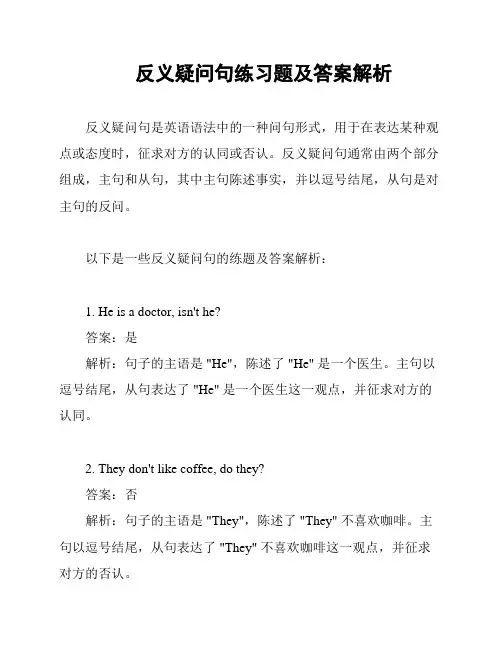
反义疑问句练习题及答案解析反义疑问句是英语语法中的一种问句形式,用于在表达某种观点或态度时,征求对方的认同或否认。
反义疑问句通常由两个部分组成,主句和从句,其中主句陈述事实,并以逗号结尾,从句是对主句的反问。
以下是一些反义疑问句的练题及答案解析:1. He is a doctor, isn't he?答案:是解析:句子的主语是 "He",陈述了 "He" 是一个医生。
主句以逗号结尾,从句表达了 "He" 是一个医生这一观点,并征求对方的认同。
2. They don't like coffee, do they?答案:否解析:句子的主语是 "They",陈述了 "They" 不喜欢咖啡。
主句以逗号结尾,从句表达了 "They" 不喜欢咖啡这一观点,并征求对方的否认。
3. You can swim, can't you?答案:是解析:句子的主语是 "You",陈述了 "You" 能游泳。
主句以逗号结尾,从句表达了 "You" 能游泳这一观点,并征求对方的认同。
4. She hasn't finished her homework, has she?答案:否解析:句子的主语是"She",陈述了"She" 没有完成她的作业。
主句以逗号结尾,从句表达了 "She" 没有完成她的作业这一观点,并征求对方的否认。
5. He won't be late, will he?答案:否解析:句子的主语是 "He",陈述了 "He" 不会迟到。
主句以逗号结尾,从句表达了"He" 不会迟到这一观点,并征求对方的否认。
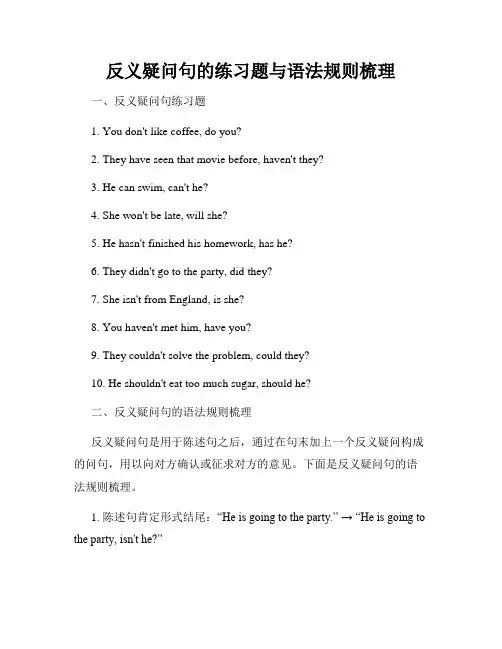
反义疑问句的练习题与语法规则梳理一、反义疑问句练习题1. You don't like coffee, do you?2. They have seen that movie before, haven't they?3. He can swim, can't he?4. She won't be late, will she?5. He hasn't finished his homework, has he?6. They didn't go to the party, did they?7. She isn't from England, is she?8. You haven't met him, have you?9. They couldn't solve the problem, could they?10. He shouldn't eat too much sugar, should he?二、反义疑问句的语法规则梳理反义疑问句是用于陈述句之后,通过在句末加上一个反义疑问构成的问句,用以向对方确认或征求对方的意见。
下面是反义疑问句的语法规则梳理。
1. 陈述句肯定形式结尾:“He is going to the party.” → “He is going to the party, isn't he?”陈述句否定形式结尾:“She doesn't like ice cream.” → “She doesn't like ice cream, does she?”2. 主语为第一人称(I)的陈述句,反义疑问句中要使用“will”,“shall”或“can”来表示征求对方的建议或请求,且要将主语换为“you”。
“I can help you,can't I?”3. 当陈述句中含有“Let's”时,反义疑问句中的主语变为“shall we”。
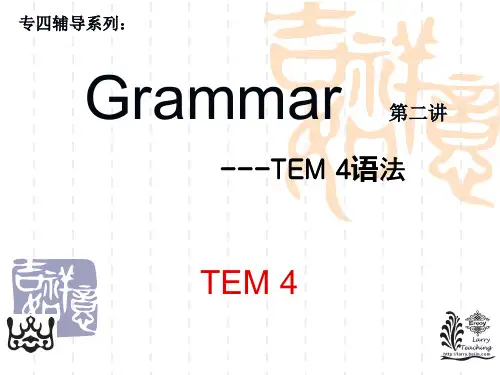
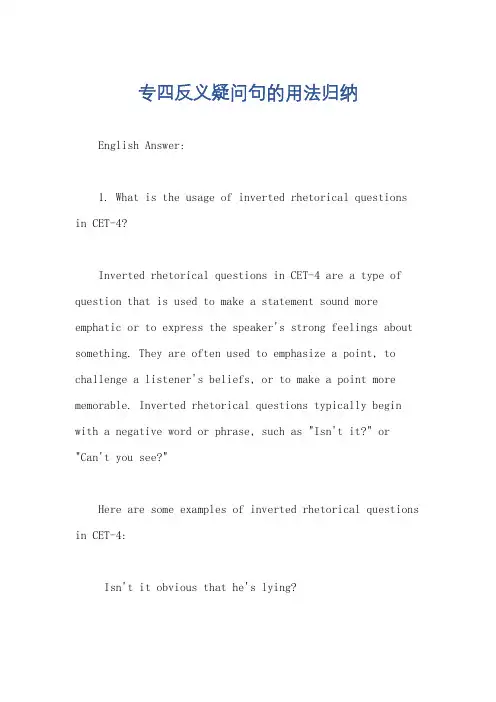
专四反义疑问句的用法归纳English Answer:1. What is the usage of inverted rhetorical questions in CET-4?Inverted rhetorical questions in CET-4 are a type of question that is used to make a statement sound more emphatic or to express the speaker's strong feelings about something. They are often used to emphasize a point, to challenge a listener's beliefs, or to make a point more memorable. Inverted rhetorical questions typically begin with a negative word or phrase, such as "Isn't it?" or "Can't you see?"Here are some examples of inverted rhetorical questions in CET-4:Isn't it obvious that he's lying?Can't you see that this is wrong?Don't you think that this is important?Inverted rhetorical questions can be a powerful toolfor expressing your thoughts and feelings. They can help you to make a point more effectively and to leave a lasting impression on your listener.2. What are some of the benefits of using inverted rhetorical questions in CET-4?There are several benefits to using inverted rhetorical questions in CET-4. These benefits include:They can make your point sound more emphatic. Inverted rhetorical questions can help you to emphasize a point and to make it more memorable.They can challenge a listener's beliefs. Inverted rhetorical questions can be used to challenge a listener's beliefs and to get them to think about something in a newway.They can make a point more memorable. Inverted rhetorical questions can help you to make a point more memorable and to leave a lasting impression on your listener.3. What are some of the drawbacks of using inverted rhetorical questions in CET-4?There are a few drawbacks to using inverted rhetorical questions in CET-4. These drawbacks include:They can sound too confrontational. Inverted rhetorical questions can sometimes sound too confrontational and can make a listener feel defensive.They can be difficult to use effectively. Inverted rhetorical questions can be difficult to use effectively and can sometimes come across as awkward or unnatural.They can be overused. Inverted rhetorical questionscan be overused and can become repetitive and boring.Overall, inverted rhetorical questions can be a powerful tool for expressing your thoughts and feelings in CET-4. However, it is important to use them sparingly and to use them effectively.中文回答:1. 专四反义疑问句的用法。
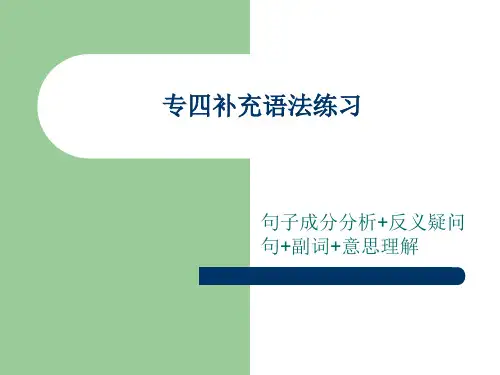
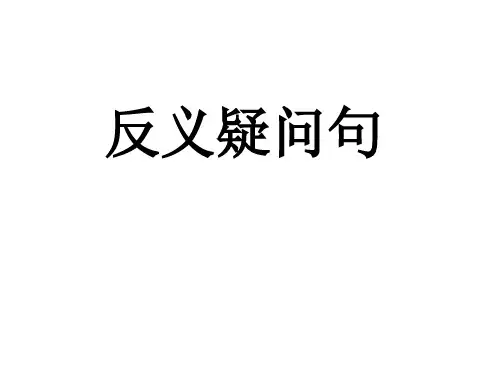
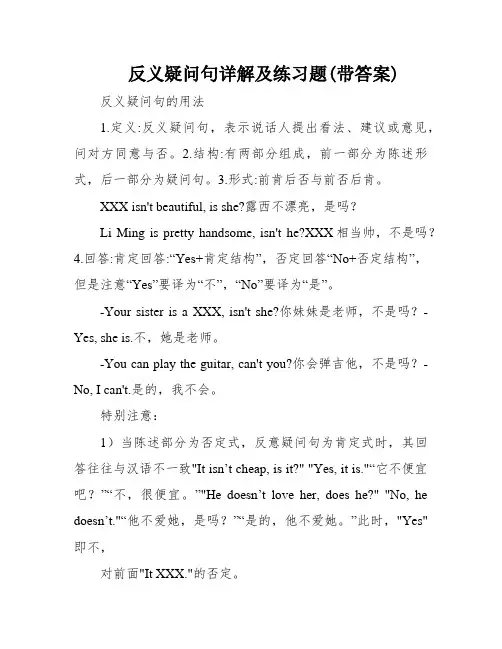
反义疑问句详解及练习题(带答案)反义疑问句的用法1.定义:反义疑问句,表示说话人提出看法、建议或意见,问对方同意与否。
2.结构:有两部分组成,前一部分为陈述形式,后一部分为疑问句。
3.形式:前肯后否与前否后肯。
XXX isn't beautiful, is she?露西不漂亮,是吗?Li Ming is pretty handsome, isn't he?XXX相当帅,不是吗?4.回答:肯定回答:“Yes+肯定结构”,否定回答“No+否定结构”,但是注意“Yes”要译为“不”,“No”要译为“是”。
-Your sister is a XXX, isn't she?你妹妹是老师,不是吗?-Yes, she is.不,她是老师。
-You can play the guitar, can't you?你会弹吉他,不是吗?-No, I can't.是的,我不会。
特别注意:1)当陈述部分为否定式,反意疑问句为肯定式时,其回答往往与汉语不一致"It isn’t cheap, is it?" "Yes, it is."“它不便宜吧?”“不,很便宜。
”"He doesn’t love her, does he?" "No, he doesn’t."“他不爱她,是吗?”“是的,他不爱她。
”此时,"Yes"即不,对前面"It XXX."的否定。
否认反意疑问句的回覆当陈述部分为肯定式,反意疑问句为否定式时,其回答一般不会造成困难,一般只需照情况回答即可:"It’s new, isn’t it?" "Yes, it is."“是新的,对吗?”“对,是新的。
”"He wants to go, doesn’t he?" "No, he doesn’t."“他想去,对吗?”“不,他不想去。
1) 反义疑问句的人称(1) 陈述部分主语是"I"时,附加问句的人称分二种情况:A. I hope that…, don't you? I can't believe it, can you?B. I will be 14 tomorrow, aren't I? I am interested in it, aren't I?(2) 陈述部分主语是everything、nothing、something等时看作单数,附加问句用it 指代。
(3) 陈述部分主语是everyone、everybody、nobody、somebody、someone、no one 、anybody、any one等时看作复数,附加问句用they指代。
(4) 陈述部分主语是不定代词one时,附加问句用one指代。
1. You and I could hardly understand, _could we_____?1995A. could IB. couldn’t youC. couldn’t weD. could we2) 情态动词:(1) 反意疑问句的陈述部分谓语有have to时,附加疑问句通常用助动词do。
(2) 反意疑问句的陈述部分谓语有need时,need做情态动词,附加疑问句仍用need,need做实义动词时,附加问句用助动词do。
(3) 反意疑问句的陈述部分为had better时,附加问用助动词had。
(4) 反意疑问句的陈述部分为would rather时,附加问句用情态动词would(5) 反意疑问句的陈述部分为used to时,附加问句用助动词did。
1. There used to be a petrol station near the park, did not there__?2006A. didn’t itB. doesn’t thereC. usedn’t it?D. didn’t there(6) 反意疑问句的陈述部分为ought to时,附加问句用助动词should.(7) 陈述部分的谓语是wish,疑问部分要用may +主语I wish to have a word with you, may I?(8) must在表示"推测"时,根据其推测的情况来确定反意疑问句:A. must do—mustn'tB. must be—随人称用系动词一般现在时C. must have done—did n't/haven't(9) 反意疑问句的陈述部分是wish时,附加问句用情态动词may。
反义疑问句解析它表示提问人的看法,没有把握,需要对方证实。
反义疑问句由两部分组成:前一部分是一个陈述句,后一部分是一个简短的疑问句,结构助动词加上人称代词主格。
句子中的助动词有be, will, should,must, can等,没有助动词的要借助do, does, did等。
两部分的人称时态应保持一致。
1.陈述部分肯定式+疑问部分否定式可记为前肯后否2.陈述部分否定式+疑问部分肯定式可记为前否后肯They work hard, don’t they? She was ill yesterday, wasn’t she?You didn’t go, did you?He can’t ride a bike, can he? He is a student, isn't he?特殊主语(1)当陈述部分的主语是陈述部分主语是不定代词everybody, anyone, somebody, nobody, no one 等,疑问部分常用复数they,有时也用单数he。
Everyone knows the answer, don't they? (does n’t he?) Nobody knows about it, do they? (does he?)(2) everything,anything,nothing,something时,附加疑问句中主语一般用it 不用they(3)this,that,或those,these时,附加疑问句中主语用it和they.(1)当陈述部分有never,seldom, hardly,few,little,barely, scarcely, nothing 等否定意义的词时,后面的反意疑问句则为肯定形式:There are few apples in the basket, are there? He can hardly swim, can he?They seldom come late, do they?(2)当陈述部分含有否定意思的词是unhappy,dislike,unfriendly,impossible等含有否定词缀的派生词,也就是有un-前缀、im-前缀、dis-前缀、-less后缀等含有词缀而意思否定的词,当做肯定句处理,疑问部分要用否定形式。
反意疑问句在陈述句之后,附加一个简短问句,对陈述部分所述事实或观点提出疑问,叫反意疑问句。
附加问句的谓语动词及主语的形式均须与陈述部分保持一致,且主语必须用人称代词。
反意疑问句须遵循“前肯后否、前否后肯”的原则。
在中考题中,反意疑问句主要考查不同情况下专项练习:1. Tell me how to solve this problem, ____?A. do youB. don't youC. will youD. shan't you2. Half an hour ought to be enough time, ____?A. shouldn't itB. didn't theyC. oughtn't half an hourD. shouldn't half an hour3. They have to go to school now, ____?A. haven't theyB. don't theyC. hadn't theyD. did they4. When the car crashed, your brother escaped being hurt, ____?A. did itB. didn't itC. didn't heD. did he5. I'm dirty, ____?A. am IB. isn't IC. aren't ID. am not I6. That's the sort of the book you want, ____?A. is thatB. isn't itC. is itD. isn't that7. I suppose you're not leaving, ____?A. are youB. don't youC. do youD. aren't you8. I wish to shake hands with you, ____?A shall I B. may IC. do ID. will I9. AIl these dictionaries are a great help to you, ____?A. aren't all theseB. are all these dictionariesC. aren't theyD. are they dictionaries10. The film that we saw last week was quite amazing, ____?A. was itB. wasn't itC. weren't weD. didn't we11. He has been writing letters all afternoon, but he should have finished them by now, ____?A. shouldn't heB. didn't youC. hasn't heD. has he12. We'd rather stay at home tonight, ____?A. isn't itB. hadn't weC. wouldn't weD. won't we13. There appeared to be no better way, ____?A. didn't thereB. were thereC. did thereD. was there14. You had some trouble finding where I live, ____?A. do IB. hadn't youC. didn't youD. don't I15. He has his hair cut every month, ____?A. has heB. hasn't heC. does heD. doesn't he16. Jim told me that he would take a trip to Britain, ____?A. would heB. wouldn't heC. did heD. didn't he17. Jimmy dare not go to church, ____?A. does heB. dare heC. daren't heD. doesn't he18. She would have worked abroad if she'd had the chance, ____?A. wouldn't sheB. would sheC. hadn't sheD. has she19. Everyone is enjoying themselves, ____?A. aren't theyB. isn't everyoneC. does heD. is he20. Anyone can have a meal here, ____?A. can theyB. can't anyoneC. can't theyD. can anyone21. Your friend needs to come earlier, ____?A. need heB. needn't heC. does heD. doesn't he22. Jenny scarcely comes to visit you, ____?A. does sheB. doesn't sheC. do youD. don't you23. Let's listen to the radio program that the teacher mentioned, ____?A. don't weB. do weC. shall weD. shan't we24. The teacher had a talk with you, ____?A. has youB. hadn't sheC. did sheD. didn't she25. You think you're funny, ____?A. do youB. are youC. don't youD. didn't you26. Janet used to take part in labor in that village, ____?A. used sheB. did sheC. didn't sheD. should she27. What a beautiful flower, ____?A. doesn't itB. isn't itC. won't itD. is it28. No one will believe how difficult his work has been, ____?A. will heB. won't nobodyC. will theyD. won't they29. You must have made the mistake, ____?A. mustn't youB. haven't youC. didn't youD. hadn't you30. Learning how to repair computers takes a long time, ____?A. isn't itB. aren't theyC. doesn't itD. don't they31. Tom has milk with breakfast, ____?A. hasn't TomB. hasn't heC. doesn't TomD. doesn't he32. They must have stayed at hotel last night, ____?A. mustn't theyB. haven't theyC. didn't theyD. hadn't they33. Something'll have to be done about the air pollution, ____?A. won't itB. will itC. has itD. does it34. You must be hungry, ____?A. must youB. mustn't youC. are youD. aren't you35. She had the clothes cleaned, ____?A. had sheB. hadn't sheC. didn't sheD. didn't her daughter36. There isn't anything wrong with the car, ____?A. is thereB. is itC. does itD. does there答案:1-5 CABCC 6-10 BABCB 11-15 ACCBD 16-20 DBAAC 21-25 DACDC 26-30 CBABC 31-36 DCADCA。
专四语言知识之反意疑问句一、知识要点反意疑问句也叫附加疑问句( Tag Question ), 主要由“陈述部分+附加疑问部分”构成。
(一) 疑问部分得主语附加疑问部分得主语通常与陈述部分得主语一致, 但需注意下列情况:1、陈述部分得主语就是everything, something, nothing 等指物得合成词时,附加疑问部分得主语用it; 当陈述部分得主语就是everyone, everybody, somebody, someone, nobody, no one 等指人得合成词时,由于这些词未指明性别,因而附加疑问句部分得主语也应用未指明姓名得they。
Everything is arranged in a good order, isn’t it? 一切都安排得井井有条,就是不就是?Someone has broken the glass, haven’t they? 有人打碎了杯子,就是吗?No one knows the history of this museum, do they? 没有人知道这座博物馆得历史,就是吗?2、当陈述部分就是there be 句式,附加疑问部分得主语也用there。
There’s something wrong, isn’t they? 出错了,就是吗?3、当陈述部分得主语就是不定式,动名词,从句或this/that 时,疑问部分得主语通常用it。
Seeing is believing, isn’t it? 眼见为实,不就是吗?This is not as beautiful as that, is it?4、当陈述部分得主语就是不定代词one时, 疑问部分得主语可以用one (正式场合),也可以用you (非正式场合)。
One can not survive without water, can you /one? 人没有水就无法生存,就是不就是?5、当陈述部分就是主从复合句,附加疑问句部分一般应与主句得主语与谓语一致;但就是,当陈述部分得主句就是第一人称主语+think, believe, suppose, suspect, expect等结构时,附加疑问部分往往与宾语从句中得主语与谓语动词保持对应关系, 但要注意否定得转移。
1) 反义疑问句的人称
(1) 陈述部分主语是"I"时,附加问句的人称分二种情况:
A. I hope that…, don't you I can't believe it, can you
B. I will be 14 tomorrow, aren't I I am interested in it, aren't I
(2) 陈述部分主语是everything、nothing、something等时看作单数,附加问句用it指代。
(3) 陈述部分主语是everyone、everybody、nobody、somebody、someone、no one 、anybody、any one等时看作复数,附加问句用they指代。
(4) 陈述部分主语是不定代词one时,附加问句用one指代。
1. You and I could hardly , _could we_____1995
A. could I
B. couldn’t you
C. couldn’t we
D. could we
2) 情态动词:
(1) 反意疑问句的陈述部分谓语有have to时,附加疑问句通常用助动词do。
(2) 反意疑问句的陈述部分谓语有need时,need做情态动词,附加疑问句仍用need,need 做实义动词时,附加问句用助动词do。
(3) 反意疑问句的陈述部分为had better时,附加问用助动词had。
(4) 反意疑问句的陈述部分为would rather时,附加问句用情态动词would
(5) 反意疑问句的陈述部分为used to时,附加问句用助动词did。
1. There used to be a petrol station near the park, did not there__2006
A. didn’t it
B. doesn’t there
C. usedn’t it
D. didn’t there
(6) 反意疑问句的陈述部分为ought to时,附加问句用助动词should.
(7) 陈述部分的谓语是wish,疑问部分要用may +主语I wish to have a word with you, may I
(8) must在表示"推测"时,根据其推测的情况来确定反意疑问句:
A. must do—mustn't
B. must be—随人称用系动词一般现在时
C. must have done—n't/haven't
(9) 反意疑问句的陈述部分是wish时,附加问句用情态动词。
3) 祈使句的反义疑问句:
(1) do..., don't...; don't..., do...,
1. When you have finished with that book, don't forget to put it back on my desk, _will
you____2008/1998
A. do you
B. don't you
C. will you
D. won't you
2. Do help yourself to some fruit, wonot______you2000
A. can’t
B. don’t
C. wouldn’t
D. won’t
3. When you have finished with that video tape, don't forget to it in my drawer, _do
you_______1997
A. do you
B. will you
C. don' t you
D. won' t you
(2) Let's 和let us后面的附加问句,分两种情况;
A. let's包括对方在内,用shall we 或shan't we。
B. us不包括对方在内,用will you 或won't you。
4) 陈述部分用no, nothing, nobody, never, few, seldom, hardly, rarely, little等否定含义的词时,疑问部分用肯定含义。
1. She seldom goes to the theatre, does she_____2010
A. doesn't she
B. does she
C. would she
D. wouldn't she
5) 否定前缀不能视为否定词,其反意疑问句仍用否定形式
6) 复合句的反疑疑问句
(1) 带有定语从句,宾语从句的主从复合句,疑问部分谓语根据主句的谓语而定
1. She would have been more agreeable if she had changed a little bit, would not she______2003
A. hadn’t she
B. hasn’t she
C. wouldn’t she
D. n’t she
(2) 上述部分主句谓语是I /we , believe, expect, suppose, imagine 等引导的宾语从句,疑问部分与宾语从句相对应构成反意疑问句:前肯定句,后用否定句;前有否定句,后面附加问句用肯定(I don't think)。
7) There+be句型的反意疑问句,附加问句用be there/be not there,由主语人称时态和数决定。